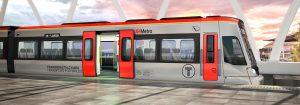 ABB traction technology will be equipped on Stadler trains under a USD 180 million contract recently signed. The contract envisages the supply of traction equipment for 160 trains and locomotives designed for Europe and North America.
ABB traction technology will be equipped on Stadler trains under a USD 180 million contract recently signed. The contract envisages the supply of traction equipment for 160 trains and locomotives designed for Europe and North America.
A customized traction technology will be installed for 71 trains to be delivered to Wales & Borders railway franchise in the United Kingdom. The traction equipment converts the electrical energy from the overhead power line, generator or battery into the correct voltage and frequency for driving the traction motors. Out of these trains, 24 will be equipped with advanced technology to enable tri-mode operation, which powers the train via catenary lines, diesel generator or batteries.
The onboard energy storage system using Lithium-ion battery cells is manufactured by ABB in Baden, Switzerland. This innovative system enables the train to operate on non-electrified sections without engaging the diesel engine, thus reducing the carbon footprint as well as significantly reducing the cost and need of electrification.
“With our recently inaugurated production facility for energy storage systems in Baden, Switzerland, ABB has expanded its technology and market leadership in the field of sustainable mobility. We can supply the entire traction chain from a single source,” said Morten Wierod, President of ABB’s Motion Business.
ABB traction technology will also be installed on 36 CityLink tram-trains for Cardiff, Wales, which will reduce the emission level. The trains will be equipped with traction and energy storage systems to replace the current diesel fleet. The tram-trains will operate with overhead lines on several sections of the network while switching to battery mode on non-electrified sections.
Traction equipment will be installed in over 100 new regional trains and locomotives for operation in Germany, Hungary, Italy, Slovenia, Canada and the United States.
ABB battery and traction systems will further drive decarbonisation and support the transition to more sustainable electromobility.
Share on:



